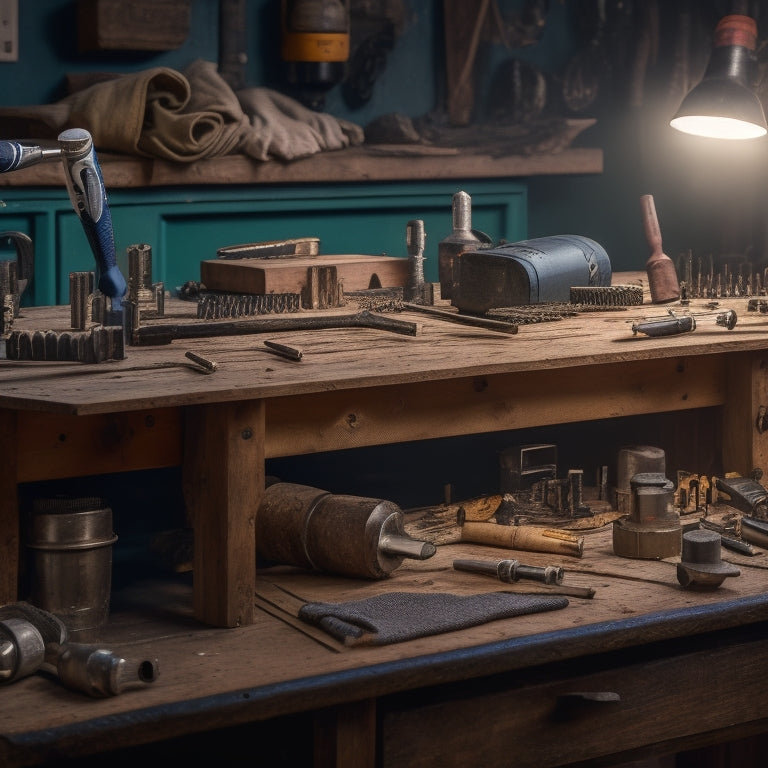
5 Best Drilling Bits for DIY Home Renovations
Share
When tackling DIY home renovations, you need the right drilling bits to avoid project delays and cost overruns. For concrete drilling, opt for heavy-duty, carbide-tipped, or diamond-coated bits depending on the surface type. For anchoring applications, choose high-quality masonry bits and pre-drill pilot holes for secure anchor points. High-speed drilling requires HSS, cobalt steel, or titanium-coated bits, while budget-friendly options include tungsten carbide tip and multi-purpose drilling bits. Finally, premium bits with TiN coating and advanced geometries provide exceptional strength and efficiency. By selecting the right bit for the task, you'll be well on your way to completing your project on time and on budget - and there's more to explore to guarantee your DIY success.
Key Takeaways
• For DIY home renovations, use high-quality masonry bits for secure anchor points in concrete, brick, and block materials.
• Carbide-tipped bits are ideal for soft concrete applications, while diamond-coated bits are better suited for harder, abrasive surfaces.
• For affordable durability, consider tungsten carbide tip bits that offer versatility and corrosion resistance.
• Master drilling techniques by starting slow, increasing speed gradually, and applying gentle pressure to avoid binding or breaking the bit.
• Invest in premium bits with advanced cutting geometries and reinforced shanks for consistent performance in tough tasks.
Top Picks for Concrete Drilling
You'll need a heavy-duty drilling bit designed specifically for concrete to tackle tough masonry projects, and we've got the top picks to help you get started.
When it comes to concrete drilling, you can't afford to compromise on quality. That's why we recommend opting for carbide-tipped or diamond-coated bits, which are designed to withstand the rigors of drilling through concrete.
When choosing the right concrete bit type, consider the specific application and the type of concrete you're working with. For example, a carbide-tipped bit is ideal for drilling through soft concrete, while a diamond-coated bit is better suited for harder, more abrasive surfaces.
Mastering drilling techniques is also essential for achieving precise results. Start with a slow, steady pace and gradually increase your speed as you gain confidence. Apply gentle to moderate pressure, and avoid applying too much pressure, which can cause the bit to bind or break.
Best Bits for Anchoring Applications
When it comes to anchoring applications, selecting the right drilling bit is essential to guarantee a secure hold and prevent damage to the surrounding material.
You'll need a bit that can effectively drill into the material and provide a strong anchor point. For anchor types like sleeve anchors, toggle bolts, and masonry anchors, you'll want to use a high-quality masonry bit. These bits are designed to drill into concrete, brick, and block, and are typically made from tungsten carbide or diamond-coated materials.
When installing anchors, follow these installation tips: always pre-drill a pilot hole to ascertain the anchor seats properly, and use a level to confirm the anchor is straight.
Additionally, make certain the anchor is appropriate for the weight and load it will be holding. Using the right anchor type and following proper installation procedures will assure a secure hold and prevent damage to the surrounding material.
High-Speed Drilling Solutions Found
High-speed drilling solutions require bits designed to operate at elevated RPMs, typically featuring specialized coatings or geometries that facilitate efficient heat dissipation and chip removal. When you're tackling high-speed drilling tasks, you need bits that can keep up with your drill's power.
Here are some high-performance drilling solutions you should consider:
-
High-Speed Steel (HSS) bits: These bits are made from a high-strength alloy that can withstand the heat generated by high-speed drilling. They're ideal for drilling through metal, wood, and plastic.
-
Carbide-tipped bits: These bits feature a tough, wear-resistant carbide tip that can handle the toughest drilling tasks. They're perfect for drilling through concrete, brick, and other masonry materials.
-
Cobalt steel bits: These bits are designed for high-temperature drilling applications and feature a cobalt steel alloy that can withstand extreme heat.
- Titanium-coated bits: These bits feature a titanium coating that reduces friction and heat buildup, making them ideal for drilling through metal and other hard materials.
Budget-Friendly Options for DIYers
For DIYers on a budget, finding affordable drilling solutions that still deliver reliable performance can be a challenge, but there are several options available that won't break the bank. You don't have to sacrifice quality for cost, as there are drilling bits made from affordable materials that can get the job done. Look for bits with a tungsten carbide tip, which provides durability and resistance to wear.
When it comes to versatility, consider investing in a set of multi-purpose drilling bits. These bits can be used for a variety of tasks, from drilling through wood to metal and drywall. They're also often designed with a universal shank, making them compatible with most drill chucks.
Another budget-friendly option is to opt for bits with a coated finish. These coatings, such as titanium or black oxide, provide a layer of protection against corrosion and wear, extending the life of the bit.
With these affordable and versatile tools, you can tackle your DIY projects with confidence, without breaking the bank. By choosing the right drilling bits, you can guarantee that your projects are completed efficiently and effectively.
Premium Bits for Heavy-Duty Use
You'll likely require premium drilling bits for heavy-duty use if you're tackling projects that involve drilling through extremely hard materials or making precise holes in thick steel. These bits are designed to withstand the rigors of demanding tasks, providing superior performance and longevity.
When shopping for premium bits, look for the following features:
-
High-speed steel (HSS) construction: Provides exceptional strength and resistance to wear and tear.
-
Titanium nitride (TiN) coating: Enhances corrosion resistance and reduces friction for smoother drilling.
-
Advanced cutting geometries: Optimized angles and shapes for improved chip removal and reduced heat buildup.
- Reinforced shanks: Adds extra durability and stability to the bit.
Premium materials and durability features come at a higher cost, but they're essential for tackling heavy-duty projects. Don't settle for subpar bits that may fail or wear out quickly.
Invest in premium bits that will deliver consistent results and save you time and frustration in the long run. With the right premium bits, you'll be able to tackle even the toughest drilling tasks with confidence.
Frequently Asked Questions
Can Drilling Bits Be Used With a Hammer Drill and a Regular Drill?
When you're working on a project, you're probably wondering if drilling bits can be used with both a hammer drill and a regular drill.
The answer is, it depends on the bit type. Masonry bits and carbide-tipped bits are compatible with hammer drills, while twist bits and step bits work better with regular drills.
Confirm drill compatibility by checking the bit's specifications before use. You don't want to damage your tool or bit, so make the right match for your project's demands.
How Often Should I Replace Drilling Bits for Optimal Performance?
Are you tired of dull, underperforming bits holding you back? It's time to get proactive about bit maintenance!
You should replace drilling bits when you notice a decrease in speed, increased heat, or excessive wear.
Check your bits regularly for signs of fatigue, like chipped edges or rust.
Follow these performance indicators to guarantee peak drilling.
Are Titanium-Coated Bits Better Than Cobalt-Coated Bits?
When it comes to coated drill bits, you're likely wondering if titanium-coated bits outperform cobalt-coated ones. The answer lies in their unique properties.
Titanium coatings offer superior durability and resistance to corrosion, making them ideal for drilling through abrasive materials.
Cobalt coatings, on the other hand, provide exceptional hardness, allowing them to withstand high temperatures and tough surfaces.
You'll need to decide which trait is more critical for your project.
Can I Use a Masonry Bit for Drilling Through Porcelain Tile?
You've heard that porcelain tile is virtually indestructible, but can you really drill through it with a masonry bit? The truth is, porcelain tile's durability makes it a tough nut to crack.
While you can use a masonry bit, not all types are created equal. Look for a carbide-tipped or diamond-coated masonry bit specifically designed for drilling through hard, abrasive materials like porcelain tile.
Anything less, and you'll be wrestling with a dull bit and a potential mess.
What Safety Precautions Should I Take When Handling Drilling Bits?
When handling drilling bits, you must prioritize drilling safety. Always wear safety glasses and gloves to protect yourself from flying debris.
Regular bit maintenance is also essential - clean and inspect your bits after each use to prevent damage and guarantee peak performance.
Additionally, store your bits in a dry, organized space to prevent rust and tangling.
Conclusion
As you wrap up your DIY home renovation, remember that the right drilling bits can make all the difference.
The theory holds true: investing in quality bits pays off in the long run.
With the top picks outlined above, you'll be equipped to tackle any task, from concrete drilling to high-speed applications.
By choosing the best bits for your project, you'll save time, money, and frustration, ensuring a professional-grade finish that will last for years to come.
Related Posts
-

Top Tools for DIY Home Renovation Plastering Success
To achieve DIY home renovation plastering success, you'll need a range of essential tools. Start with hand tools like...
-

Affordable Plastering Tools for Home Renovation Success
You're taking the first step towards a successful home renovation by investing in the right plastering tools. Start w...
-

Get Discounted Plastering Tool Sets for DIY Renovations
You can find discounted plastering tool sets online, at local hardware stores, and thrift stores, offering a range of...


